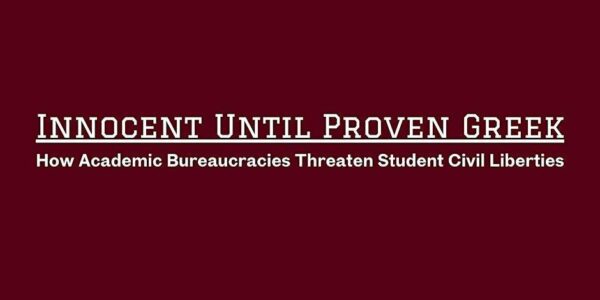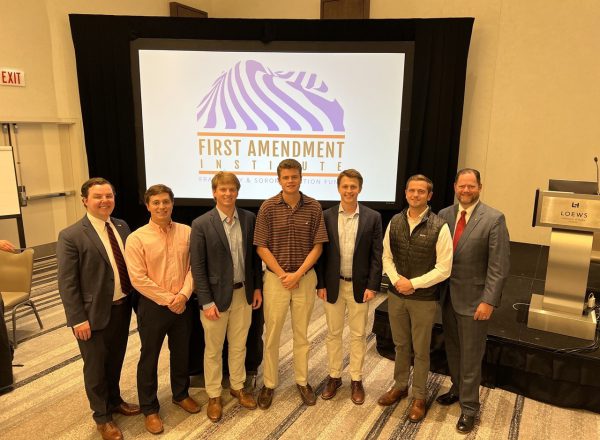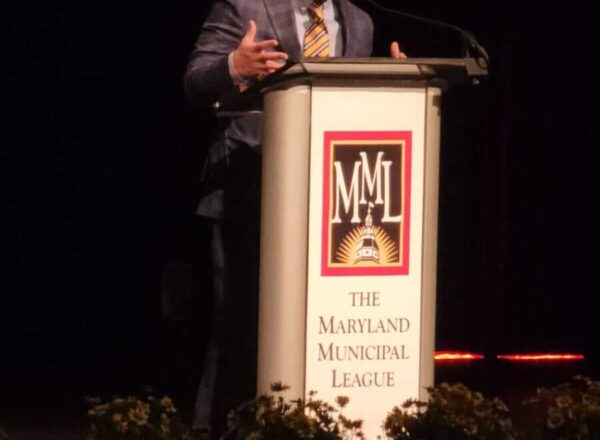 (WASHINGTON, D.C.) – At a National Press Club panel hosted by the Fraternity and Sorority Action Fund on Thursday, students and experts discussed how actions taken by the University of Maryland last month infringed upon individual civil liberties and ran afoul of the law and the school’s own administrative procedures. These violations led to multiple students and Greek organizations filing lawsuits, which remain ongoing, against UMD administrators in March and April 2024. The panel also discussed how widespread administrative abuses have become and how these overreaches endanger student well-being.
(WASHINGTON, D.C.) – At a National Press Club panel hosted by the Fraternity and Sorority Action Fund on Thursday, students and experts discussed how actions taken by the University of Maryland last month infringed upon individual civil liberties and ran afoul of the law and the school’s own administrative procedures. These violations led to multiple students and Greek organizations filing lawsuits, which remain ongoing, against UMD administrators in March and April 2024. The panel also discussed how widespread administrative abuses have become and how these overreaches endanger student well-being.
View the full panel below.
Key Takeaways
- The University of Maryland continues to deny they issued a “no contact” order for thousands of students. But their own website, where they published the letters they sent to these students, proves in no uncertain terms that they forbade students from speaking with each other.
- UMD convened all fraternity and sorority leaders in a room. Administrators then distributed “sticky notes” and ordered students to write down rumors they might have heard about other fraternities and sororities. A day later, administrators announced they were banning Greek life and commissioning an outside law firm to conduct interrogations of hundreds of students.
- At no time were any students accused of any wrongdoing. Hundreds were forced to endure interrogations, despite not being aware of any charges being brought against them or anyone else.
- Both fraternity and sorority leaders report having the university’s outside law firm demand to see their cell phone contents, including text messages, during their interrogations. When one sorority president indicated she was not comfortable turning over her phone, the investigator accused her of refusing to comply in efforts to protect fraternity members.
- The University of Maryland coerced participation in these interrogations. If students failed to comply, they’d be in violation of the code of conduct and subject to disciplinary retaliation. Students were not allowed an attorney to advocate for them, but instead, were limited to a “support person” listening to the interview. Students, some still teenagers, feared a power imbalance with lawyers using sophisticated interrogation techniques meant to draw out answers from them.
- The University of Maryland is unapologetic for its unlawful approach and is doubling down, insisting their new method should serve as a national “model” for higher education.
- Experts say this is troubling for student civil liberties, which are already under attack from heavy-handed administrations across the country who routinely violate due process, freedom of speech and freedom of association rights of their students. Concerns are compounded when administrators express a preference for some students or groups over others, especially on ideological grounds.
- To ensure the protection of their children’s rights, parents should remain alert and involved in their education. Students can rely upon outside organizations like the Foundation for Individual Rights and Expression (FIRE), American Council of Trustees and Alumni (ACTA) and others to help them stand up against any attempts to violate their civil liberties.
About the Panelists
- Dr. Dawn Watkins Wiese is the Chief Operating Officer of FRMT, Ltd., which provides insurance for men’s fraternal organizations. She is the founder of Plaid, an organizational and leadership consultancy. Prior to consulting, Dr. Wiese was the Vice President of Student Affairs, Dean of Students and Dean of Freshmen at Washington and Lee University in Lexington, Va. She also served as Associate Dean of Students and Director of Student Events and Events Planning at Guilford College in Greensboro, NC.
- Dr. Steve McGuire is the Paul & Karen Levy Fellow in Campus Freedom at the American Council of Trustees and Alumni ACTA). Prior to joining ACTA, Dr. McGuire was director of the Matthew J. Ryan Center for the Study of Free Institutions and the Public Good and associate teaching professor in the Augustine and Culture Seminar Program at Villanova University. He holds a bachelor’s degree from the University of Lethbridge, a master’s degree from the University of Saskatchewan and a PhD from The Catholic University of America, where he was a Bradley Fellow and an ISI Richard M. Weaver Fellow. He was a 2021 Claremont Institute Lincoln Fellow.
- Micah Kamrass is an attorney specializing in higher education at Manley Burke, where he represents both the men’s and women’s groups suiting the University of Maryland for civil rights violations. He attended The Ohio State University for undergraduate, graduate and law school. Here, he served as the student body president representing more than 40,000 of his fellow students, as well as president of Alpha Epsilon Pi and on the group’s International Supreme Board of Governors. He earned an EdD in Higher Education Leadership and Policy from Vanderbilt University. He is also an adjunct professor teaching higher education law at the University of Louisville.
- Farah Aliabadi is a sophomore at the University of Maryland studying psychology. She is the president of Zeta Tau Alpha Sorority.
- Garrett Bruce is a junior at the University of Maryland studying finance and management. He is the president of Kappa Alpha Order and the former Chief Justice of the UMD Interfraternity Council Judiciary Board.



